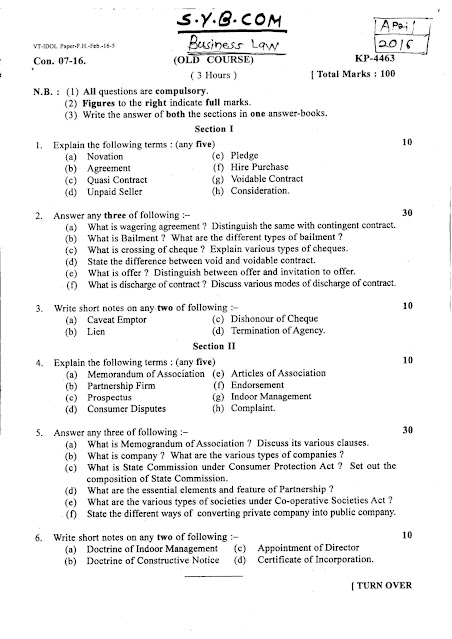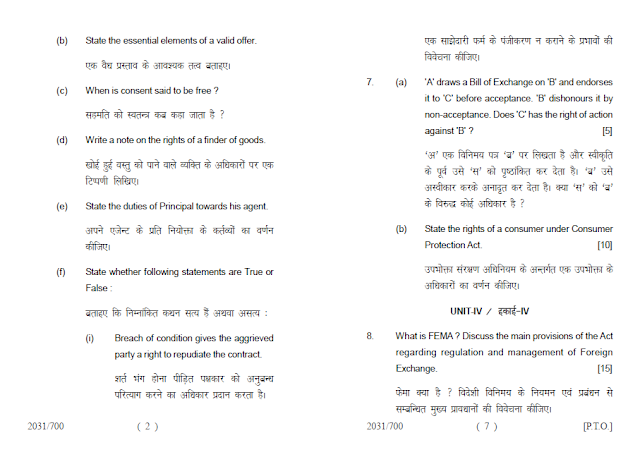Tuesday, October 17, 2023
Saturday, October 7, 2023
Wednesday, September 1, 2021
OSPU BCO Business Law Dec 2019 Question Paper
Odisha State Open University Old Question Paper [Total No. of Printed Pages : 5
Term End Examination – December, 2019 Course Code BCO – 02
BUSINESS LAW
Bachelor of Commerce (Honours) (BCOM)
Time : 3 hours Full Marks : 100
The figures in the right-hand margin indicate marks
Attachment in PDF: Click Here to download OSPU BCO Business Law Dec 2019 Question Paper
Attachments in Scanned Copies (Images):
Wednesday, March 17, 2021
Lucknow University B.Com. Part-II (Back Paper) BUSINESS LAW - 2018 Question Paper
Lucknow University Old Question Paper / Previous Years Question Paper
B.Com. Part-II Examination, 2018
Q.P. Code : 2031
(Back Paper)
BUSINESS LAW
Time : 3 Hours Maximum : 100 Marks
Attachment Type: PDF and Images
PDF Download: Click Here to Download Lucknow University B.Com. Part-II (Back Paper) BUSINESS LAW - 2018 Question Paper
Question Paper Scanned Images Download
Saturday, March 5, 2016
MDSU BBA Business Law 2008 Question Paper

QP Type: Old / Previous Question Paper
Course: Business Law B.B.A
Exam Year: 2008
Subject: BUSINESS LAW
Time:3 hours
Maximum marks: 75
SECTION A (3×5=15)
Answer any three questions. All questions carry equal marks.
1. Explain the legal rules regarding auction sales.
2. Who is competent to enter into a contract?
3. What are the rights of a partner?
4. State the rules of an agency.
5. State any four differences between a cheque and a bill of exchange.
SECTION B (4×15=60)
Answer any four questions. All questions carry equal marks.
6. What is meant by consideration? Explain the legal rules regarding consideration.
7. What is meant by negotiable instrument? Explain different kinds of negotiable instruments.
8. Explain the rights of an unpaid seller.
9. Describe the various modes by which a contract may be discharged.
10. Differentiate between conditions and warranties.
11. Write short notes on :
(a) Implied Contract.
(b) Hire Purchase Agreement.
(c) Dissolution of a firm.
12. Explain the modes of termination of agency.
Wednesday, December 30, 2015
2011 Question Paper,Madras University Question Paper,BUSINESS LAW,PXS

Subject :BUSINESS LAW
Subject Code :PXS
OCTOBER 2011 U/ID 5231/PXS
Time : Three hours Maximum : 100 marks
PART A — (10 × 3 = 30 marks)
Answer ALL questions.
All questions carry equal marks.
Define/explain/answer the following :
1. (a) Contingent Contract.
(b) Restitution.
(c) Effect of destruction of subject-matter.
(d) Modes of delivery under The Sale of Goods
Act.
(e) Bill of Exchange.
(f) Endorsement.
(g) Partnership deed.
(h) Special agent.
(i) Occupier under the Factories Act.
(j) Disqualification for bonus.
PART B — (5 × 6 = 30 marks)
Answer any FIVE questions.
All questions carry equal marks.
2. What are the kinds of quasi-contract?
3. Explain the differences between sale and
agreement to sell.
4. Classify negotiable instruments.
5. What are the duties of partner?
6. Write a detailed note on ‘bonus formula’ given in
the Payment of Bonus Act 1965.
7. What are the provisions for prevention of strikes
and lockouts?
8. What is caveat emptor? What are the exceptions to
the rule?
PART C — (2 × 20 = 40 marks)
Answer BOTH the questions.
All questions carry equal marks.
9. (a) State the legal rules as to consideration.
Or
(b) In what circumstances is partnership
dissolved automatically and compulsorily by
the court?
10. (a) What are the permissible deductions under
the Payment of Wages Act?
Or
(b) Describe the rules regarding effective delivery
of goods.
———————
Wednesday, December 2, 2015
B.Com BUSINESS LAW 2nd Year 3rd Semester JU 2014 Question Paper

Ref No. Ex COM/31/30/2015(Old)
2nd Year B.Com (sem-III) University Examination, 2014
(3rd Semester/Repeat/Supplementary/Spl Supplementary/Old /Annual/Bi-Annual)
SUBJECT: BUSINESS LAW (OLD SYLLABUS)
PAPER: Theory (CMS3.1)]
TIME: 2 hrs FULL MARKS: 50
Attempt any five questions; each question carries equal marks.
1. a) What is contract?
b) What are the essential elements of a valid contract? (2+8=10)
2. a) What is an offer?
b) When is the offer completed?
c) State the rules of valid offer. (3+3+4=10)
3. a) Write the difference between sale and agreement to sell.
b) What are the different types of goods according to sale of goods ACT 1930? (5+5=10)
4. a) What do you mean by Negotiable Instrument?
b) Write the characteristics of bills of Exchange.
c) Write the differences between Bills of Exchange and promissory note. (2+4+4=10)
5. a) Who is a consumer?
b) State the consumer rights.
c) State the functions of Consumer redressal cell. (2+5+3=10)
6. a) Discuss the contents of Partnership deed.
b) What are the rights & duties of partners? (5+5=10)
7. a) Explain in detail the regulation of foreign exchange management Act.
b) What is current A/C transactions and capital A/C transactions? (5+5=10)
8. a) What is a company?
b) Explain the characteristics of the company.
c) State 3 differences between private and public companies. (2+5+3=10)
Download Link : B.Com BUSINESS LAW 2nd Year 3rd Semester JU 2014 Question Paper
Monday, November 23, 2015
University Of Pune Question Paper,BUSINESS LAW,2013 Question Paper,B. B. M. (I.B.) ( Semester - V )

B. B. M. (I.B.) ( Semester - V ) Examination - 2013
BUSINESS LAW
(New 2008 Pattern)
Time : 3 Hours] [Max. Marks : 80
Instructions :
(1) All questions are compulsory.
(2) Figures to the right indicate full marks.
Q.1) Define and explain ‘Proposal’ in a Contract. Explain the rules for Valid
Proposal. [15]
OR
Q.1) What is ‘Breach of Contract’ ? Explain various remedies available
in Breach of Contract. [15]
Q.2) Define Delivery of Goods and explain its kinds. State the rules
relating to Delivery of Goods. [15]
OR
Q.2) Who is ‘Unpaid Seller’ ? What are his rights against Goods ?
Explain. [15]
Q.3) Elaborate Concept of Partnership. How Partnership differes from
a Company ? [15]
OR
Q.3) State and explain the Rights of a Partner against his Fellow Partners. [15]
[4374]-502 1 P.T.O.
Seat
No.
Q.4) What is ‘Patent’ ? What are important features of a Patent ? Explain
with illustrations. [15]
OR
Q.4) Define and explain in brief following terms under the Consumer
Protection Act, 1986 : [15]
(a) Consumer
(b) Complaint
(c) Complainant
Q.5) Write short notes : (Any Four) [20]
(a) Wagering Agreements
(b) Caveat Emptor
(c) Kinds of Partnership
(d) District Forum
(e) E-commerce
(f) Trademarks
Sunday, November 22, 2015
BUSINESS LAW,B. B. A. ( Semester - III ),University Of Pune Question Paper,2013 Question Paper

B. B. A. ( Semester - III ) Examination - 2013
BUSINESS LAW
(New 2008 Pattern)
Time : 3 Hours] [Max. Marks : 80
Instructions :
(1) All questions are compulsory.
(2) Figures to the right indicate full marks.
Q.1) Define ‘Acceptance’ in a Contract. Explain the Rules regarding Valid
Acceptance. [15]
OR
Q.1) Discuss the provisions regarding ‘Tender’, ‘Time’ and ‘Place’ of
Performance of a Contract. [15]
Q.2) Elaborate the doctrine of ‘Caveat Emptor’. What are the exceptions
to this doctrine ? [15]
OR
Q.2) Explain the procedure adopted by the ‘District Forum’ to deal with
Consumer Complaints. [15]
Q.3) What are the Rights of a Partner against his fellow Partners ?
Explain. [15]
OR
Q.3) Discuss Concept of ‘Authority of a Partner’. What acts are covered
and those fall outside the Implied Authority of a Parther ? [15]
Q.4) Discuss various types of Companies. [15]
OR
Q.4) State and explain various provisions regarding Statutory Meeting. [15]
[4372]-302 1 [P.T.O.
Seat
No.
Q.5) Write short notes : (Any Four) [20]
(a) Concept of Fraud in a Contract
(b) Modes of Delivery of Goods
(c) National Commission under C.P.A., 1986
(d) Kinds of Partnerships
(e) Statement in Lieu of Prospectus
(f) Extra Ordinary Meeting of a Company

















![Dr.A.P.J.Abdul Kalam University BSC AG I SEM Rural Sociology & Educational Psychology [AEX511] Dec - 2020 Question Papers Dr.A.P.J.Abdul Kalam University BSC AG I SEM Rural Sociology & Educational Psychology [AEX511] Dec - 2020 Question Papers](https://blogger.googleusercontent.com/img/a/AVvXsEhY5uhQmwWK1N-CxLfiA9sqbo0THIfiSpBT7quB4pALXfP9cO8aQfIKTa7XnRCms5OD17u5nFLilyx0cwdDbdCGWIBsJ3pzlVPACOfuwEA2BI6gDaqOq0qngBZlxCmbK3-OAj42Rbe1FTVYoXQEf_KNpPDyrNecTFMpJ5BELRLyUK3w12mdzNC4-bnn=s72-w496-c-h640)




